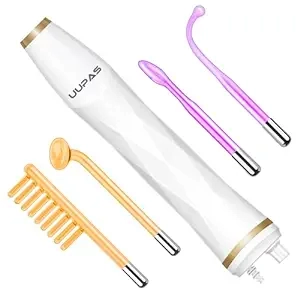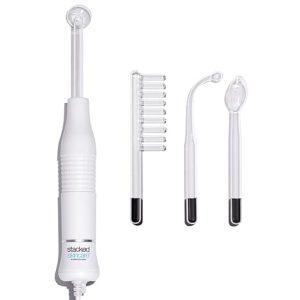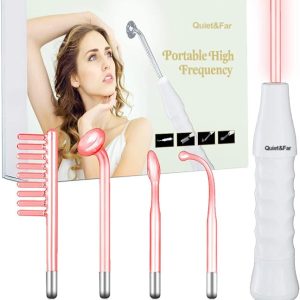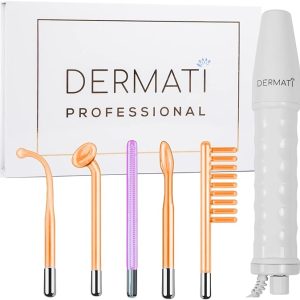Ensuring a clean high-frequency wand is crucial for maintaining optimal performance and user safety. In this guide, we’ll provide steps and tips on how to clean your high-frequency wand effectively.
From powering off and unplugging to handling attachments with care, these expert-recommended tips will help you maintain hygiene, extend the wand’s lifespan, and enhance its overall functionality.
Follow these easy instructions to keep your high-frequency wand in top condition for reliable use.


How to Clean High Frequency Wand?
Here’s how to clean a high-frequency wand in these simple steps:
| Step | Instructions |
|---|---|
| 1. Power Off | Ensure the high frequency wand is turned off. |
| 2. Unplug | Disconnect the wand from the power source. |
| 3. Remove Attachment | If applicable, remove any removable attachments. |
| 4. Damp Cloth | Dampen a soft cloth with a mild, soapy solution. |
| 5. Wipe Gently | Wipe the wand’s surface gently with the damp cloth. |
| 6. Dry Thoroughly | Allow the wand to air dry completely before use. |
| 7. Attachment Care | Clean attachments separately following instructions. |
| 8. Store Safely | Store the wand in a clean, dry place when not in use. |
| 9. Regular Maintenance | Clean after each use for optimal hygiene. |
How Do You Clean High-Frequency Electrodes?
To clean high-frequency electrodes, use a hospital-grade surface disinfectant or rubbing alcohol.
- Begin by turning off and unplugging the device,
- Carefully detach the electrode from the wand.
- Handle it with care by wrapping a towel or tissue around the electrode and pulling it straight out of the handle to prevent damage.
- Wipe the electrodes using a damp cloth and the chosen disinfectant, avoiding immersion in any liquid.
For general maintenance, a simple run through warm water and soap is sufficient for cleaning. Regularly follow these steps to ensure proper hygiene and longevity of the electrodes without the need for specialized tools.
How Often Should High-Frequency Wand Be Cleaned?
The frequency of cleaning a high-frequency wand depends on how often you use it.
For regular or daily use, it’s recommended to clean the wand after each session to maintain cleanliness and prevent the accumulation of residues. If the wand is used less frequently, a weekly cleaning routine should suffice.
Additionally, after any intensive or prolonged use, it’s advisable to clean the wand promptly to remove any potential buildup of dirt or contaminants.
Regular cleaning not only ensures optimal hygiene but also contributes to the longevity and effective performance of the high-frequency wand.
What Not to Do With High-Frequency Wand?
Here are some things you should be careful about while using a high-frequency wand:
- Avoid Immersion: Do not immerse the high-frequency wand in water or any liquid, as this can damage the device.
- Don’t Skip Power Off: Never attempt to clean or handle the wand without turning it off and unplugging it first to ensure safety.
- No Harsh Chemical: as they may damage the delicate components.
- Handle Carefully: When removing electrodes, use a towel or tissue to protect them from breakage.
- Skip DIY Repairs: If there are issues, consult the manufacturer or a qualified professional for assistance.
- Avoid High Temperatures: as this can affect its performance and longevity.
- Don’t Overlook Maintenance: Neglecting regular cleaning and maintenance can reduce the effectiveness and lifespan of the high-frequency wand.


Why Do High Frequency Wands Smell?
High-frequency wands may give a slight odor during use due to the ionization process.
When the wand generates high-frequency currents through the gas inside the glass electrode, it produces a violet or orange light, depending on the gas used. This ionization process can release a faint, characteristic odor.
Additionally, the electrodes and surrounding components may heat up during operation, contributing to the smell. It’s important to note that this odor is typically normal and not a cause for concern.
However, if the smell is unusually strong, resembles burning, or if there are other signs of malfunction, it is advisable to discontinue use and have the device inspected by a professional to ensure safety and proper functionality.
What Type of Surface Disinfectant to Use to Clean High-Frequency Wand?
To clean a high-frequency wand, it is recommended to use a hospital-grade surface disinfectant or rubbing alcohol.
These disinfectants are effective in eliminating bacteria and germs on surfaces without causing damage to the wand.
Ensure that the disinfectant is suitable for use on electronic devices and follow the manufacturer’s guidelines for both the disinfectant and the high-frequency wand to ensure proper cleaning and maintenance.
Risks of Not Cleaning High-Frequency Wand Properly:
Neglecting proper cleaning of a high-frequency wand can pose various risks, including:
- Hygiene Concerns: Accumulated dirt and residues on the wand’s surface can harbor bacteria.
- Reduced Effectiveness: Residue buildup can diminish its effectiveness in skincare treatments or other applications.
- Skin Irritation: Unclean electrodes carry residues that can irritate the skin during use.
- Device Malfunction: Residues can interfere with the internal components of the wand.
- Unpleasant Odor: Failure to clean may result in an unpleasant odor during operation due to accumulated residues. This can impact the user experience and indicate a lack of hygiene.
To mitigate these risks, adhere to recommended cleaning practices outlined by the manufacturer and establish a regular cleaning routine for the high-frequency wand.
Conclusion:
In summary, keeping your high-frequency wand clean is vital for effective use and safety. Follow the provided steps for regular cleaning, handle with care, and use suitable disinfectants to ensure optimal hygiene.
Regular maintenance and understanding the risks of neglecting cleaning practices underscore the importance of a clean high-frequency wand for a reliable and safe user experience.
Resources Consulted:
Tips on How to Clean Electrical Appliances in a Proper ways – streedirectory
A Microbiologist Reveals The Impact Of Dirty Beauty Tools – themodems





